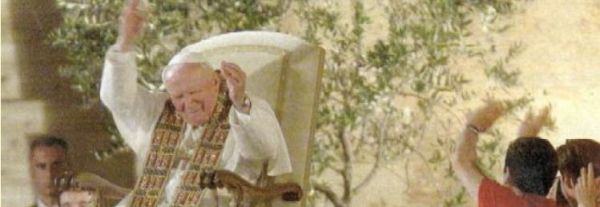Dear Children!
Jesus brings the Truth
The Child whom we see in the manger at Christmas grew up as the years passed. When he was twelve years old, as you know, he went for the first time with Mary and Joseph from Nazareth to Jerusalem for the Feast of the Passover. There, in the crowds of pilgrims, he was separated from his parents and, with other boys and girls of his own age, he stopped to listen to the teachers in the Temple, for a sort of "catechism lesson". The holidays were good opportunities for handing on the faith to children who were about the same age as Jesus. But on this occasion it happened that this extraordinary boy who had come from Nazareth not only asked very intelligent questions but also started to give profound answers to those who were teaching him. The questions and even more the answers astonished the Temple teachers. It was the same amazement which later on would mark Jesus' public preaching. The episode in the Temple of Jerusalem was simply the beginning and a kind of foreshadowing of what would happen some years later.
Dear boys and girls who are the same age as the twelve-year-old Jesus, are you not reminded now of the religion lessons in the parish and at school, lessons which you are invited to take part in? So I would like to ask you some questions: What do you think of your religion lessons? Do you become involved like the twelve-year-old Jesus in the Temple? Do you regularly go to these lessons at school and in the parish? Do your parents help you to do so?
The twelve-year-old Jesus became so interested in the religion lesson in the Temple of Jerusalem that, in a sense, he even forgot about his own parents. Mary and Joseph, having started off on the journey back to Nazareth with other pilgrims, soon realized that Jesus was not with them. They searched hard for him. They went back and only on the third day did they find him in Jerusalem, in the Temple. "Son, why have you treated us so? Behold, your father and I have been looking for you anxiously" (Lk 2:48). How strange is Jesus' answer and how it makes us stop and think! "How is it that you sought me? Did you not know that I must be in my Father's house?" (Lk 2:49). It was an answer difficult to accept. The evangelist Luke simply adds that Mary "kept all these things in her heart" (2:51). In fact, it was an answer which would be understood only later, when Jesus, as a grown-up, began to preach and say that for his Heavenly Father he was ready to face any sufferings and even death on the cross.
From Jerusalem Jesus went back with Mary and Joseph to Nazareth where he was obedient to them (Lk 2:51). Regarding this period, before his public preaching began, the Gospel notes only that he "increased in wisdom and in stature, and in favour with God and man" (Lk 2:52).
Dear children, in the Child whom you look at in the Crib you must try to see also the twelve-year-old boy in the Temple in Jerusalem, talking with the teachers. He is the same grown man who later, at thirty years old, will begin to preach the word of God, will choose the Twelve Apostles, will be followed by crowds thirsting for the truth. At every step he will confirm his extraordinary teaching with signs of divine power: he will give sight to the blind, heal the sick, even raise the dead. And among the dead whom he will bring back to life there will be the twelve-year-old daughter of Jairus, and the son of the widow of Naim, given back alive to his weeping mother.
It is really true: this Child, now just born, once he is grown up, as Teacher of divine Truth, will show an extraordinary love for children. He will say to the Apostles: "Let the children come to me, do not hinder them", and he will add: "for to such belongs the kingdom of God" (Mk 10:14). Another time, as the Apostles are arguing about who is the greatest, he will put a child in front of them and say: "Unless you turn and become like children, you will never enter the kingdom of heaven" (Mt 18:3). On that occasion, he also spoke harsh words of warning: "Whoever causes one of these little ones who believes in me to sin, it would be better for him to have a great millstone fastened round his neck and to be drowned in the depth of the sea" (Mt 18:6).
How important children are in the eyes of Jesus! We could even say that the Gospel is full of the truth about children. The whole of the Gospel could actually be read as the "Gospel of children".
What does it mean that "unless you turn and become like children, you will not enter the kingdom of heaven"? Is not Jesus pointing to children as models even for grown-ups? In children there is something that must never be missing in people who want to enter the kingdom of heaven. People who are destined to go to heaven are simple like children, and like children are full of trust, rich in goodness and pure. Only people of this sort can find in God a Father and, thanks to Jesus, can become in their own turn children of God.
From the Vatican, 13 December 1994.
[Pope John Paul II, Letter to the Children in the Year of the Family] From the Vatican, 13 December 1994.












